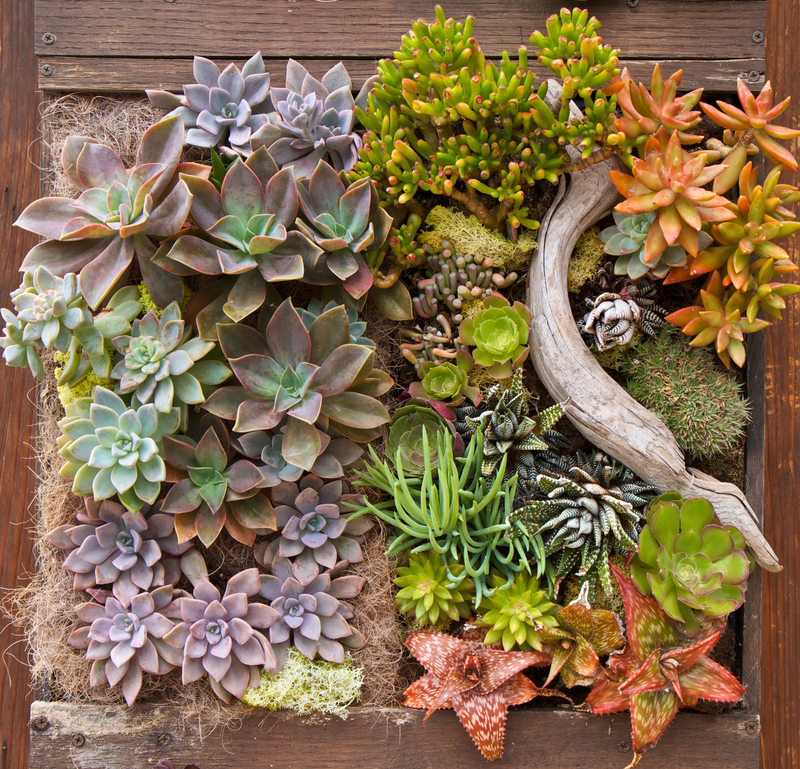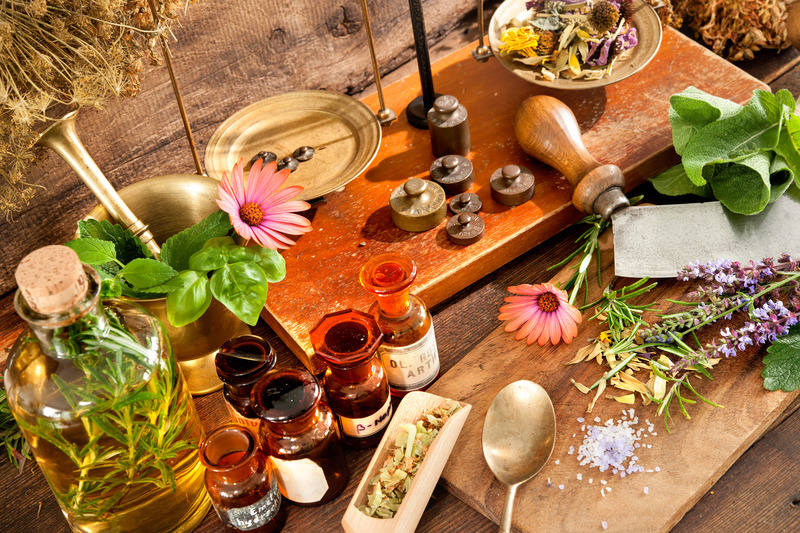Organic Alchemy: Waste into Nutrient-Rich Soil
Posted on 16/09/2025
Organic Alchemy: Turning Waste into Nutrient-Rich Soil
Unlock the secret of transforming everyday waste into fertile, healthy earth through the ancient yet revolutionary science of composting. Whether you are a passionate gardener, an eco-conscious homeowner, or simply keen to live sustainably, exploring the wonders of organic alchemy will empower you to nourish both your plants and the planet.
What is Organic Alchemy?
At its core, organic alchemy is the magical process of converting organic waste materials into nutrient-rich soil. This natural recycling system, often known as composting, leverages the power of microbes, fungi, insects, and time to break down kitchen scraps, yard waste, and other biodegradable matter. The result? Black gold--soil teeming with life and ready to energize your plants.
Why Transform Waste into Nutrient-Rich Soil?
- Reduces landfill usage: Organic matter in landfills creates methane, a harmful greenhouse gas. Composting prevents this.
- Enriches soil health: The finished compost adds essential nutrients and improves soil structure.
- Promotes ecological balance: It supports beneficial soil organisms and enhances biodiversity.
- Reduces the need for chemical fertilizers: Homemade compost is all-natural and free from synthetic additives.
- Cost-effective gardening: Save money on store-bought soil amendments.

The Science Behind the Transformation
Organic matter decomposition is nature's recycling program. Microorganisms such as bacteria and fungi break down waste into humus. During this organic soil enhancement process, the waste heats up, killing many pathogens and weed seeds, leaving only beneficial organisms and nutrients.
Essential Ingredients for Nutrient-Rich Soil Creation
To successfully turn waste into quality nutrient-rich soil, balance and diversity matter. Here's what you need:
- Green materials (Nitrogen-rich): Fresh grass clippings, vegetable scraps, coffee grounds.
- Brown materials (Carbon-rich): Dried leaves, straw, shredded cardboard, wood chips.
- Water: Moisture is critical for microorganisms to thrive and break down organic matter.
- Air: Proper aeration speeds up composting and keeps it odor-free.
Balanced ratios are essential: too much green material makes compost slimy, while excess brown causes slow decomposition. Aim for a rough 2:1 ratio of browns to greens by volume.
Methods of Organic Waste Transformation
1. Traditional Composting
This time-tested process uses piles or bins to compost waste outdoors. Layer your kitchen scraps, garden debris, and other organic materials, turning regularly for aeration. Over several months, you'll notice the pile transform into earthy-smelling, crumbly soil.
2. Vermicomposting (Worm Composting)
Harnessing the digestive powers of red wiggler worms, vermicomposting is ideal for indoor or small-scale operations. The worms devour kitchen scraps, producing castings rich in nutrients and beneficial microbes--creating a premium version of nutrient-enriched soil.
3. Bokashi Fermentation
Bokashi is an anaerobic composting method using special microorganisms (known as Effective Microorganisms) to ferment waste quickly and with minimal odor. The process works on a wider range of kitchen scraps, including meat and dairy, turning them into pre-compost that can be buried to finish decomposing and enrich the earth.
4. Leaf Mold
Simply pile up fallen leaves and allow nature to work its slow magic. Over six to twelve months, leaf mold forms--an excellent soil conditioner that improves water retention and soil structure.
Steps to Create Nutrient-Rich Soil from Waste
1. Start Collecting Waste
- Kitchen scraps: vegetable peels, fruit cores (avoid meat/grease unless using bokashi)
- Yard waste: grass clippings, leaves, small twigs
- Non-glossy paper, shredded cardboard, coffee grounds and filters, eggshells
Tip: Avoid adding diseased plants, pet waste, or glossy/colored paper.
2. Build Your Compost Pile or Bin
Layer greens and browns. Start with a base of woody material (twigs, coarse stalks) for aeration. Alternate green and brown layers, keeping the pile moist but not soggy.
3. Maintain & Turn the Compost
- Monitor moisture: like a damp sponge
- Turn pile every 1-2 weeks for oxygenation
- Add materials as they accumulate, then rebalance the pile
4. Harvest and Use the Finished Compost
- Ready compost is dark, crumbly, and earthy in smell
- Use as mulch, soil amendment, or seed starting mix
- Work into garden beds, around trees, or on lawns for a natural nutrient boost
Benefits of Nutrient-Rich Soils Created from Organic Waste
- Improved plant health: Provides essential macro and micro-nutrients for robust growth
- Enhanced soil structure: Improves drainage, air flow, and root penetration
- Boosts soil biodiversity: Encourages beneficial microbes, fungi, and invertebrates
- Retention of moisture: Reduces need for constant watering
- Suppresses plant diseases and pests: Healthy soils build stronger plant defenses
Real-Life Impact: Case Studies in Organic Soil Alchemy
Farmers, urban gardeners, and even cities around the world have adopted waste-to-soil practices. For example:
- San Francisco's Zero Waste Initiative: Mandatory composting diverted over a million tons of organic waste, creating enough compost to fertilize thousands of acres annually.
- Cape Town, South Africa: Community vermicomposting programs produce high-yield vegetable gardens in urban neighborhoods.
- Organic farms: Compost becomes a central part of soil fertility management, replacing synthetic fertilizers and contributing to long-term sustainability.
Frequently Asked Questions (FAQs) About Composting and Organic Alchemy
What waste can you compost?
- Yes: Vegetable scraps, fruit peels, coffee grounds, tea bags (without staples), eggshells, crushed shells, cardboard, shredded paper, yard waste.
- No: Meat, bones, dairy (except in bokashi), oils, diseased plant material, pet waste, glossy paper.
Is composting safe and easy at home?
Absolutely! With basic knowledge of organic waste transformation, anyone can start. Compost bins, tumblers, and worm bins are widely available for all spaces and climates. Properly maintained piles do not smell bad and require little upkeep.
How long does it take to turn kitchen scraps to nutritious humus?
With ideal conditions (balanced carbon and nitrogen, moisture, aeration), standard composting takes 2-6 months, while vermicomposting can be even faster.
Does composting save money?
Yes! Not only does home soil enrichment cut costs of buying fertilizers, but reducing waste also decreases garbage collection fees.
Advanced Tips: Enhancing the Alchemy of Waste-to-Soil
Additives for Enhanced Nutrient Content
- Rock dust: Adds vital trace minerals to your finished soil.
- Seaweed: Supplies potassium, magnesium, and growth hormones.
- Biochar: Locks carbon into the soil and boosts microbial activity.
Compost Tea
Soak finished compost in aerated water to create a "tea" that can be sprayed on plant leaves and soil for a rapid nutrient and microbial boost.
Hot vs. Cold Composting
- Hot composting: Piles heat up to 130-160?F, breaking down materials quickly and killing pathogens/weeds. Requires regular turning and monitoring.
- Cold composting: Minimal maintenance, but takes longer and may not kill all pests or seeds.
Beyond Compost: Innovations in Waste-to-Soil Alchemy
Scientists and innovators are pushing the boundaries of waste transformation into nutritious soil. Some cutting-edge trends include:
- In-vessel composting: Enclosed systems that manage temperature, aeration, and moisture automatically--great for urban environments.
- Black soldier fly larvae: These insects process organic waste into high-value compost and animal feed.
- Community-scale biogas digesters: Produce energy from organic waste and create liquid soil amendments as a byproduct.
How to Start Your Own Organic Alchemy Journey
- Assess your waste: Track and quantify your organic discards for a week.
- Select your method: Traditional pile, tumbler, vermicompost, or bokashi according to your needs.
- Source a bin: Purchase or build your own compost container.
- Begin collecting: Set up a kitchen scrap bucket and yard waste station.
- Educate yourself: Join workshops, read guides, or connect with local gardening groups.
- Monitor and adjust: Inspect, turn, and adjust as your compost matures.
- Harvest your "black gold": Celebrate as you witness your homegrown nutrient-rich soil.

The Environmental Impact: Reimagining Our Waste Cycle
By turning waste into life-giving earth, we close the loop in our consumption cycle. Every banana peel, coffee ground, and autumn leaf that bypasses landfill contributes to a greener, healthier world. Embracing organic alchemy fortifies the earth, combats climate change, and offers a powerful antidote to our throwaway culture.
Conclusion: Harnessing the Power of Organic Alchemy
From ancient farmers to modern urbanites, the timeless art of organic alchemy teaches us that waste is not an end, but a new beginning. Whether you have a large backyard, a tiny balcony, or even a small kitchen corner, you can embark on your own journey of waste transformation into nutrient-rich soil. The rewards are profound--healthier plants, a thriving local ecosystem, savings in your pocket, and the immense satisfaction of nurturing our planet's vital, living soil.
Get started today: Join the worldwide movement of organic alchemists and witness the astonishing power of turning everyday waste into the fertile foundation for a greener, brighter future.
Latest Posts
Vertical Gardening: A New Green Revolution
Container gardening: A guide to urban green spaces
Herb Gardening Tips for Every Season



